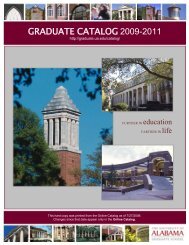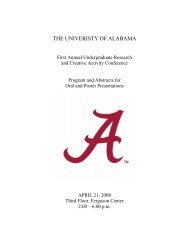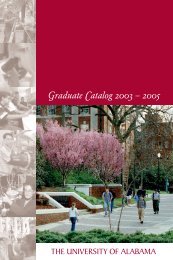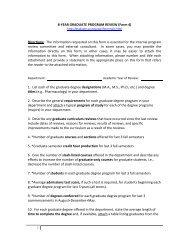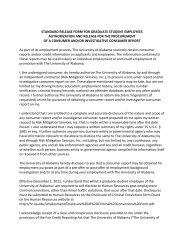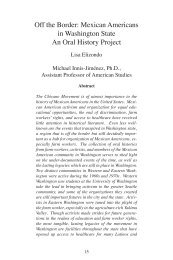Letters from a Planter's Daughter: Understanding Freedom and ...
Letters from a Planter's Daughter: Understanding Freedom and ...
Letters from a Planter's Daughter: Understanding Freedom and ...
Create successful ePaper yourself
Turn your PDF publications into a flip-book with our unique Google optimized e-Paper software.
169<br />
<strong>Letters</strong> <strong>from</strong> a Planter’s <strong>Daughter</strong><br />
To those who in the 19th century held up the sanctity of marriage <strong>and</strong> the<br />
family as the foundation of society, slavery represented a perversion of<br />
the social order. 101 That great number of former slaves legitimated their<br />
marriages after emancipation suggests one of two, or a mixture of both,<br />
reasons: that the idea of a lasting, permanent union was as important to<br />
slave families as the white middle class; or that white middle-class ideals<br />
may have influenced the enslaved men <strong>and</strong> women who lived among<br />
them. 102 In either case, maintaining the integrity of the family unit would<br />
have been a concern for free African-American women—especially women<br />
who, like the Townsends, knew firsth<strong>and</strong> how sexual abuse by a white<br />
master affected a family. 103 To be a full-time wife <strong>and</strong> mother, the cultural<br />
norm for middle- <strong>and</strong> upper-class white women, may have been desirable<br />
precisely because it was an impossibility under slavery. 104<br />
Until 1868, Susanna’s story contradicted the broad assertion that<br />
freedom, for African-American women, had meaning almost exclusively<br />
within a family context—Susanna, after all, sought independence <strong>from</strong><br />
her family both through education <strong>and</strong> direct control of her inheritance. 105<br />
Care must also be taken not to assume that Susanna understood freedom<br />
as the right to enter into the unfreedom of domestic patriarchy. 106 In Susanna’s<br />
case, marriage provided an escape <strong>from</strong> the patriarchal authority<br />
not of a husb<strong>and</strong>, but her half-brother Wesley. And in June 1868, Susanna<br />
had run short of options. She was panicked, hiding her pregnancy <strong>from</strong><br />
Wesley, Adelaide, the father of the child, <strong>and</strong> Cabaniss, but she grasped<br />
also at a possible solution: marriage. She could see herself in a little house<br />
in Kansas if there is no more than three rooms <strong>and</strong> an acre of grown—one<br />
bedroom for husb<strong>and</strong> <strong>and</strong> wife, a second room to cook <strong>and</strong> eat, <strong>and</strong> a third<br />
room perhaps as a nursery for the baby no one knew was coming. 107 It<br />
would not have been a fully independent life, but perhaps she would, at<br />
101 Carl N. Degler, At Odds: Women <strong>and</strong> the Family in America <strong>from</strong> the Revolution to the<br />
Present (New York, New York: Oxford University Press, 1980), 112.<br />
102 Ibid. 116<br />
103 Deborah Gray White, Ar’n’t I a Woman? Female Slaves in the Plantation South (New<br />
York: W.W. Norton & Company, 2nd edition, 1999), 162.<br />
104 Schwalm, A Hard Fight for We.<br />
105 Ibid.<br />
106 Thavolia Glymph writes of the fallacy of “freedom for enslaved women [coming] to be<br />
understood as the right to patriarchy <strong>and</strong> its kindred domestic norms,” Out of the House<br />
of Bondage: The Transformation of the Plantation Household (Cambridge: Cambridge<br />
University Press, 2008), 4.<br />
107 Susanna Townsend to S.D. Cabaniss, letter dated 4 June 1866.



